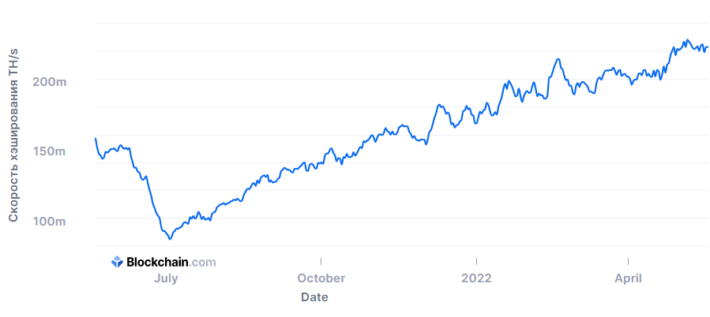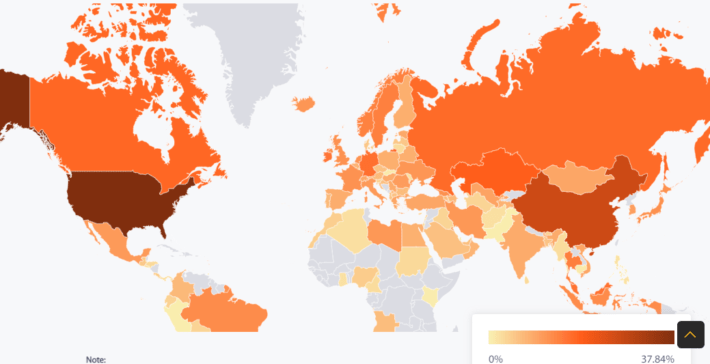Chinese miners still own a fifth of the Bitcoin network’s hash rate. How do they operate?
China can once again be considered a major geographical hub for Bitcoin mining. According to the Cambridge Digital Assets Programme (CDAP) team of analysts, China’s hidden mining centres currently control one-fifth of the main cryptocurrency’s network hash rate. However, back in the spring of 2021, the Chinese government officially banned cryptocurrency mining, forcing the local mining business to relocate en masse to other countries. Apparently, some remained. Here is a closer look at the situation.

As a reminder, before China banned cryptocurrency mining, China accounted for about 66 percent of the Bitcoin network's hash rate, i.e. all the computing power of its miners. This state of affairs was easy enough to understand. First, the country has sources of cheap - yet environmentally damaging - electricity.
Secondly, many ASIC miners and other cryptocurrency mining equipment are based in China, which guarantees the proximity of Chinese users to production. Accordingly, they not only receive the devices quickly, but also among the first to do so. In addition, many companies are testing their devices, which also affects the situation.
In the spring of 2021, however, all that has changed. The authorities took it upon themselves to gradually ban coin mining in various provinces. Because of this, some miners were forced to leave the country and move – or at least move their equipment – to the Russian Federation, the US, Kazakhstan, Canada and other states.

Cryptocurrency miner
Although, as is now clear, not everyone was in a hurry to leave the state.
Is mining banned in China
The Chinese government has been actively restricting cryptocurrency enthusiasts for a long time, but the official ban on mining in mid-2021 was a powerful blow to the local infrastructure of BTC miners. While back in September 2020, the Chinese owned around 67 per cent of the cryptocurrency’s total network hash rate, a few weeks after the government order, the country’s share of Bitcoin network device computing capacity has dropped to almost zero.
According to Decrypt’s sources, during the mass migration of miners, Bitcoin’s hash rate even dipped to 57 hashes per second at one point. By comparison, that figure is now above 220 hashes per second. So what turns out, Chinese miners have started to come back to their own country?

Bitcoin network hash rate
In fact, many of them have not even left the PRC and have found a way to continue their activities covertly. To do this, they use foreign proxy services to hide their own location, so they are not easy to track down. Experts note that China’s share of Bitcoin’s hashtray is now around 21 per cent. At the same time, the United States has quickly become a leader in this regard, with the capacity of hosted mining equipment in America reaching 38 percent of the BTC hashrate.
Here’s how analysts at Cambridge Digital Assets Programme commented on their report. The quote is cited by Bloomberg.
As the mining ban went into effect, and time has passed, it seems that “underground” miners have become more confident. They seem happy with the protection offered by local proxy services.

Hash rate distribution map
By the way, even before the Chinese government’s crackdown, the Bitcoin mining sector in the US was showing rapid growth. In the first half of last year, the share of the network’s hashrate hosted within the country rose from 11 percent to 22 percent. In America itself, three states – Georgia (31 percent of the country’s hash rate), Texas (11 percent of the country’s hash rate) and Kentucky (11 percent of the country’s hash rate) – have become major mining hubs.
The fact that the state’s top-level ban on mining has not killed the industry in the country speaks to the extreme resilience of decentralised Bitcoin. What is happening in China sets a precedent that other governments around the world will definitely take notice of. Banning mining entirely is essentially useless. Well, all the government would gain from such a policy is the cost of harassment and the transition of the industry completely into a shadow economy.
It is much more reasonable to introduce soft regulations for cryptocurrency mining. Firstly, miners would be protected by the law. Secondly, the state can get an additional source of budget replenishment through mining taxes.

Cryptocurrency miner
We believe that this situation can hardly be considered surprising. Still, some miners have small capacities, because of which they can hide their own activities without significant problems. Well, the owners of large quantities of ashikers would not benefit from shipping them to other distant countries, taking care of documentation, business registration and taxes. The only question is how actively Chinese law enforcement authorities are trying to prevent this situation. After all, 20 percent of the Bitcoin network's global hash rate is a huge amount of equipment.
What do you think about this? Share your opinion in our millionaires cryptochat. Discuss other important developments in the blockchain world there.
SUBSCRIBE TO OUR CHANNEL ON TELEGRAM. THERE’S EVEN MORE INTERESTING NEWS HERE.















